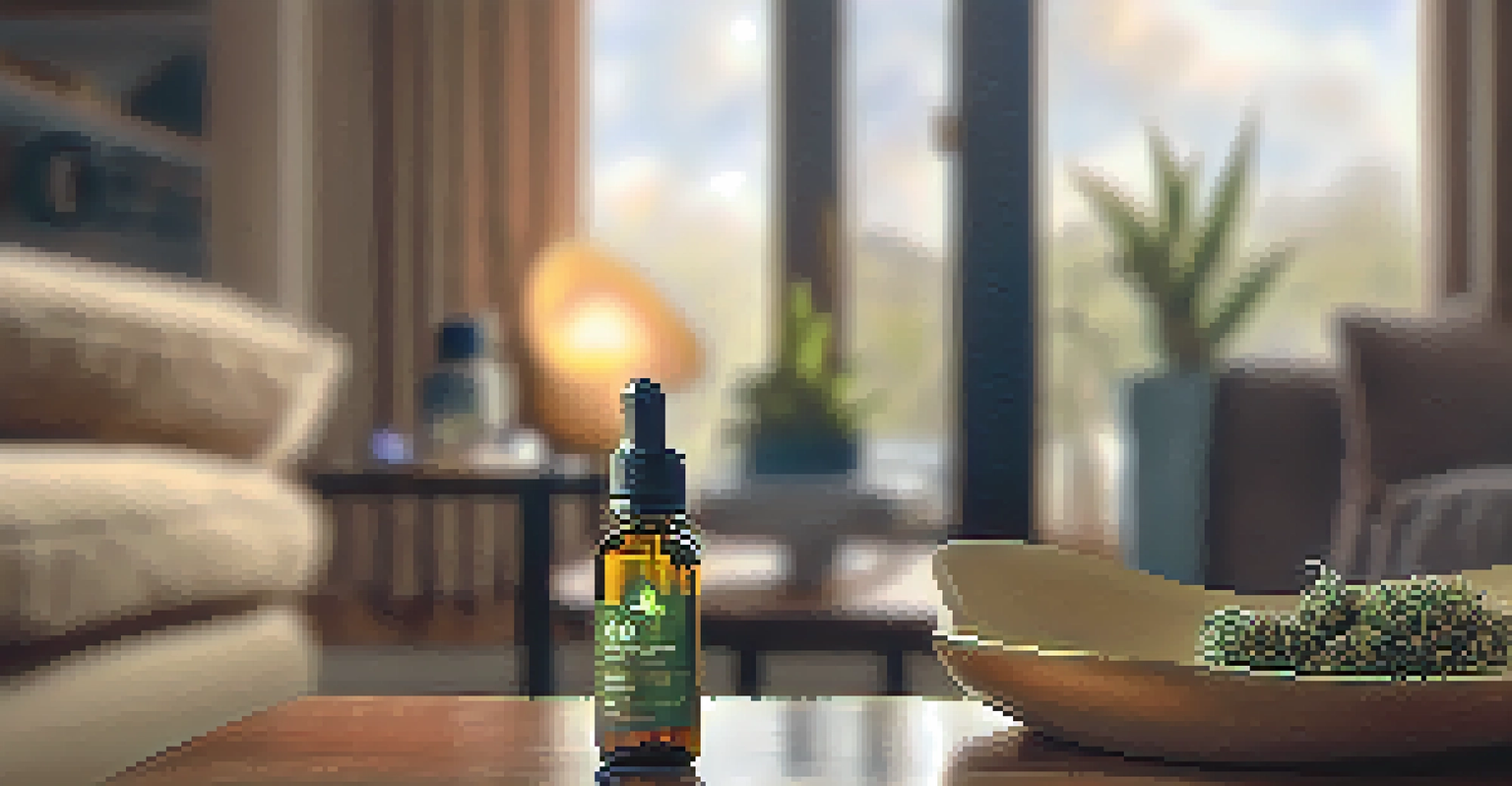Cannabinoids and Anxiety: Can They Help Reduce Symptoms?

Understanding Cannabinoids: What Are They?
Cannabinoids are natural compounds found in the cannabis plant. The most well-known cannabinoids are THC (tetrahydrocannabinol) and CBD (cannabidiol). While THC is associated with the psychoactive effects of marijuana, CBD is often praised for its potential therapeutic benefits without the 'high'. This distinction is crucial when discussing their impact on anxiety.
The greatest wealth is health.
These compounds interact with the body’s endocannabinoid system, which plays a role in regulating various physiological processes, including mood and stress responses. By understanding how cannabinoids work, we can better assess their potential effects on anxiety. It’s like having a key that fits into a lock—when cannabinoids bind to their receptors, they may help unlock pathways to peace and calm.
Related Resource
Research into cannabinoids and anxiety is still evolving, but there’s growing interest in their potential role in mental health treatment. As more studies emerge, they could lead to alternative therapies for those struggling with anxiety.
The Science Behind Cannabinoids and Anxiety Relief
Studies suggest that cannabinoids, particularly CBD, may help alleviate anxiety symptoms. CBD is thought to influence serotonin levels in the brain, which is a key neurotransmitter that helps regulate mood. Think of serotonin as the 'feel-good' chemical; when it’s balanced, it can lead to a more relaxed state.

Some clinical trials have shown that CBD can significantly reduce anxiety in certain situations, such as public speaking or social interactions. Participants reported feeling calmer and more at ease, which indicates that cannabinoids might serve as a useful tool for managing acute anxiety. It’s as if CBD acts like a comforting friend during stressful moments.
Cannabinoids and Anxiety Relief
Cannabinoids, particularly CBD, may help alleviate anxiety symptoms by influencing serotonin levels in the brain.
However, while the initial findings are promising, it's essential to remember that more comprehensive research is needed to fully understand the effects of cannabinoids on anxiety. Individual responses can vary, so what works for one person may not work for another.
Potential Benefits of Using Cannabinoids for Anxiety
One of the key benefits of using cannabinoids, especially CBD, is their potential to avoid the side effects commonly associated with traditional anti-anxiety medications. Many people experience drowsiness, weight gain, or dependency when using pharmaceuticals. In contrast, CBD is generally well-tolerated, making it an appealing alternative for those seeking relief.
Your health is an investment, not an expense.
Cannabinoids may also offer a more holistic approach to anxiety management. For example, combining CBD with mindfulness practices, like meditation, can create a synergistic effect that enhances overall well-being. Imagine tackling anxiety with both nature’s remedy and a calm mind—quite a powerful duo!
Related Resource
Moreover, cannabinoids can be consumed in various forms, such as oils, edibles, or capsules, allowing individuals to choose what works best for them. This flexibility can make it easier for people to incorporate cannabinoids into their daily routines.
Potential Risks and Side Effects of Cannabinoids
While cannabinoids hold promise, they are not without potential risks and side effects. Some individuals may experience adverse reactions, such as dizziness, fatigue, or changes in appetite. It's important to approach cannabinoid use with caution and be aware of how your body reacts.
Additionally, the legal status of cannabinoids varies by region, which can complicate access to quality products. Not all products are created equal, and the lack of regulation can lead to inconsistencies in dosage and purity. It’s akin to navigating a maze—one must be careful to find the right path.
Benefits Over Traditional Meds
Using cannabinoids like CBD can avoid the side effects associated with traditional anti-anxiety medications, offering a more holistic approach.
Consulting with a healthcare professional before starting any cannabinoid regimen is always wise. They can provide personalized guidance and help you weigh the potential benefits against the risks.
How to Choose the Right Cannabinoid Product
Choosing the right cannabinoid product can feel overwhelming due to the sheer variety available on the market. Start by considering your specific anxiety symptoms and how you prefer to consume cannabinoids. For instance, oils and tinctures offer quick absorption, while edibles may provide longer-lasting effects.
It’s also crucial to look for products that have been third-party tested, ensuring they contain the advertised amounts of cannabinoids without harmful contaminants. Think of it as reading reviews before buying a new gadget—you want to ensure you’re getting a quality product.
Related Resource
Lastly, start with a low dose and gradually increase it until you find what works best for you. This trial-and-error approach can help you avoid unpleasant side effects and discover the right balance.
Personal Stories: Cannabinoids and Anxiety Management
Hearing real-life experiences can be enlightening when considering cannabinoids for anxiety. Many individuals have shared their journeys with CBD, noting significant improvements in their anxiety levels. For instance, one woman described how CBD helped her manage her anxiety during a high-pressure work presentation, allowing her to focus and perform better.
These stories often highlight the personal nature of anxiety management. What works wonders for one person may not resonate with another, but it’s encouraging to see the variety of positive outcomes. It reminds us that there’s no one-size-fits-all solution.
Importance of Individualization
Choosing the right cannabinoid product should be based on individual symptoms and preferences, as responses can vary widely among users.
Listening to these anecdotes can help demystify cannabinoids and provide hope for those searching for effective anxiety relief. They paint a picture of possibility and resilience, showing that managing anxiety is a journey worth exploring.
The Future of Cannabinoids in Anxiety Treatment
As research continues to advance, the future of cannabinoids in anxiety treatment looks promising. Scientists are exploring various cannabinoids and their effects, aiming to create targeted therapies that can address specific anxiety disorders. Imagine a future where personalized cannabinoid treatments become a standard practice in mental health care.
This shift towards a more nuanced understanding of cannabinoids could revolutionize how we approach anxiety management. It may lead to the development of new formulations that harness the best properties of cannabinoids while minimizing side effects. The potential for innovation is exciting!

Moreover, as societal perceptions of cannabinoids evolve, there’s hope for greater acceptance within the medical community. This acceptance could pave the way for more comprehensive studies and, ultimately, better treatment options for those struggling with anxiety.